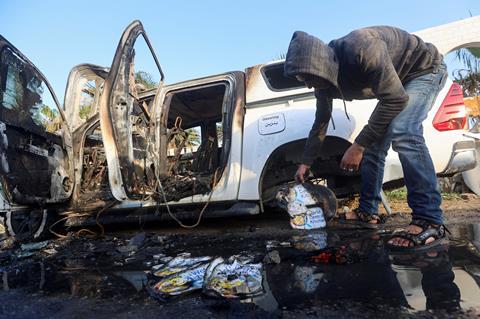Old Testament prophets would have condemned Israel for departing from the ways of peace, says George Pitcher. The death of seven aid workers in Gaza is another example of innocents caught in the crossfire. It has to stop

Perhaps it’s the chilling line, attributed to Josef Stalin, that “one death is a tragedy – a million is a statistic”. But, as the death tolls builds inexorably in Gaza, it’s the individual stories of violent death that cut through the politics to sear the soul.
A couple of months ago it was six-year-old Hind Rajab, who died after making a truly heartbreaking call for help from a car under Israeli fire, among the bodies of those who had come to rescue her. She, too, was later found dead. There is a rage of injustice that burns when one writes or reads those words.
Now, it’s the seven aid workers, three of them British, obliterated in a seemingly targeted air strike on their vehicles. God knows, it’s bad enough witnessing the suffering of innocent Gazan civilians. But there is a peculiar irony when those who perish are trying to bring some relief, in love and peace, to that suffering, in their quaintly named World Central Kitchen (WCK) vans.
The Hebrew bible is packed with warning that Israel will reap what it sows in violence
Before the lazy whataboutery of a million online trolls chimes in that what I’ve just said is unconscious (at best) antisemitism, it was the same when Hamas committed its unspeakable acts last October in southern Israel, which triggered this war.
Who can forget – or would want to – the young Jewish woman, Millet Ben-Haim, traumatised by the horrors she witnessed at the music festival she attended with her friends, sobbing on ITV News: “I don’t want revenge, I want peace.”
These stories of crushed and extinguished human lives speak of an unfolding abomination in the Middle East of biblical proportions. And with Israel’s assassination of Iranian officials in Syria, it may only get worse before that young woman has any hope of finding what she publicly wished for.
A prophetic voice
In one sense, hers is a prophetic voice, as was little Hind Rajab’s - and all those who speak of the relief of human suffering, like those at WCK. As with the prophets of old, they are voices calling out in the wilderness of cruelty, exile and war, stating not just how it is, but how it should be.
In that, they follow the tradition of the Old Testament prophets of the Hebrew Bible, condemning both Hamas and Israel for departing from the ways of peace.
More on Israel and Gaza
- Israel and Gaza: A prayer for peace
- Is the Prince of Persia causing chaos in Gaza?
- Should Christians take sides when praying for Israel and Gaza?
- The death of Gazans has reached biblical proportions. Christians must speak out against it
- As a Christian, I believe a Gaza-Israel ceasefire is needed
- The media hasn’t explained what motivates Hamas. The answer is religion
- What the Bible says about the Israel-Gaza war
Jeremiah was a massive critic of Israel and warned of the destruction of Jerusalem. Isaiah warned of the catastrophes that would greet Israel and Judah if they continued to “work in darkness” (Isaiah 29:15). Amos 4:1-3 predicts violent military action followed by exile for Israelites if they matched the immorality of their neighbours.
And so it goes on. The Hebrew bible is packed with warnings that Israel will reap what it sows in violence. But Israel’s prime minister, Benjamin Netanyahu, from among all this prophetic literature, prefers to reference a moment from 1 Samuel 15:3 when God, through his prophet Samuel, tells Saul to punish the insurgency of the Amalekites: “Do not spare them; put to death men and women, children and infants.”
Who can forget the young Jewish woman, sobbing: “I don’t want revenge, I want peace.”
No one should accuse Netanyahu and his far-right Likud party of not taking that injunction seriously. And yet the Palestinian and Jewish voices I cite above cry out, if not for vengeance, then for justice. Those are prophetic voices that echo, in their way, the consequences of violence cited by the likes of Jeremiah, Ezekiel and Isaiah.
Love your neighbour
Perhaps the ancient Israelites’ most celebrated prophet was Moses. The Jewish book of law, Deuteronomy, traditionally ascribes its authorship to Moses, though modern scholars claim another, anonymous scribe.
In any event, it contains the line known to Christians as the summary of the law: “Hear, O Israel: The Lord our God, the Lord is one. Love the Lord your God with all your heart and with all your soul and with all your strength” (Deuteronomy 6:5-6).
That’s a warning as well as a commandment, repeated by Jesus and coupled with the Levitical injunction to “love your neighbour as yourself” (Matthew 22:37-39). To suggest that Israel has observed that particular line of law is to stretch credibility.
The prophetic voice – the one that starts “Hear, O Israel” – has not been joined by Western nations. Rishi Sunak’s “clearly there are questions that need to be answered” barely cuts it. President Joe Biden is late to the party with his “outrage”.
The time for soft diplomacy in this region is long gone. As the voices of victims in Gaza are progressively silenced, we need prophetic voices, as of old, to warn Israel of the consequences of its actions.
It may even be that the time for politics in Gaza is over and that a time for prophecy has begun. For the moment, it’s a mystery where its voices will emerge from and be heard by.






































5 Readers' comments